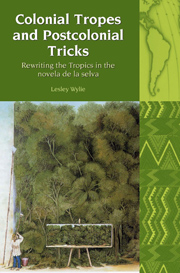Book contents
- Frontmatter
- Contents
- Acknowledgements
- Introduction
- 1 Colonial Tropes and Postcolonial Tricks
- 2 Tropical Nature and Landscape Aesthetics
- 3 Salvaging the Savage
- 4 Paradise Lost: Wilderness and the Limits of Western Escapism
- 5 Jungle Fever: Degeneration as a Trop[olog]ical Disease
- Conclusion
- Bibliography
- Index
2 - Tropical Nature and Landscape Aesthetics
- Frontmatter
- Contents
- Acknowledgements
- Introduction
- 1 Colonial Tropes and Postcolonial Tricks
- 2 Tropical Nature and Landscape Aesthetics
- 3 Salvaging the Savage
- 4 Paradise Lost: Wilderness and the Limits of Western Escapism
- 5 Jungle Fever: Degeneration as a Trop[olog]ical Disease
- Conclusion
- Bibliography
- Index
Summary
It is almost impossible to think of any natural space on earth which has not been written about: ‘everywhere we look we encounter a pre-interpreted landscape, or a landscape made legible’, as Jonathan Smith has argued. Tropical landscapes, in particular, are cultural as well as natural constructs – spaces both real and imaginary which have inspired utopian fiction, visual art, and countless sensationalist travel accounts. Within a European literary tradition key places within the tropics such as ‘Amazonia’ have often been reduced to little more than discursive constructs, conceived variously as lands of promise and adventure or as green hells of disease and savagery. David Arnold has compared Western attitudes and ideas about the tropics – what he terms ‘tropicality’ – to Said's definition of ‘Orientalism’. Just as representations of the Orient in European art and letters have centred on the region's dissimilarity to the Occident, so has the tropics been understood as embodying all that the ‘temperate’ zone is not. In Tristes Tropiques Claude Lévi-Strauss exemplifies the pervasiveness of stereotypes of the tropics as ‘radically different’:
Brazil and South America did not mean much to me. However, I can still remember, with absolute clarity, the pictures conjured up […]. I imagined exotic countries to be the exact opposite of ours, and the term ‘antipodes’ had a richer and more naïve significance for me than its merely literal meaning. […] I expected each animal, tree or blade of grass to be radically different, and its tropical nature to be glaringly obvious at a glance.
- Type
- Chapter
- Information
- Colonial Tropes and Postcolonial TricksRewriting the Tropics in the novela de la selva, pp. 40 - 67Publisher: Liverpool University PressPrint publication year: 2009

